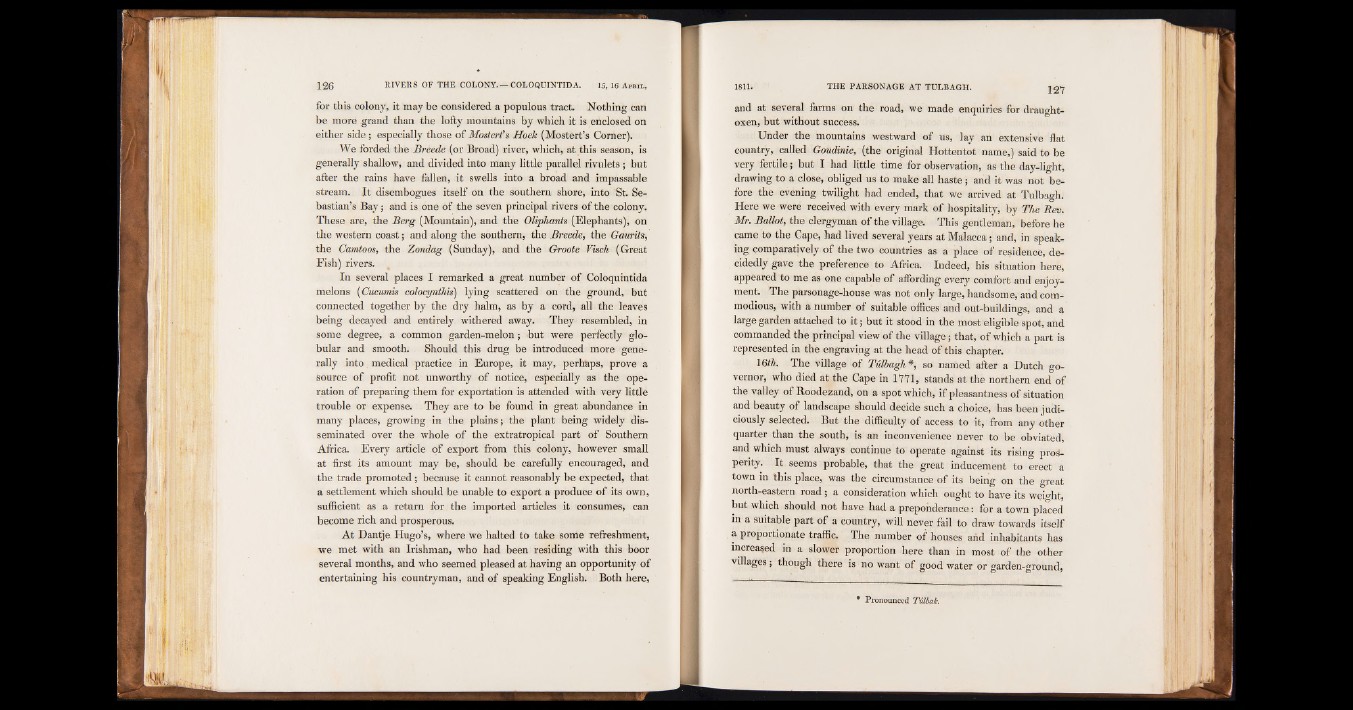
for this colony, it may be considered a populous tract. Nothing can
be more grand than the lofty mountains by which it is enclosed on
either side; especially those of Mostert’s Hoek (Mostert’s Corner).
We forded the Breede (or Broad) river, which, at this season, is
generally shallow, and divided into many little parallel rivulets; but
after the rains have fallen, it swells into a broad and impassable
stream. It disembogues itself on the southern shore, into St. Sebastian’s
Bay; and is one of the seven principal rivers of the colony.
These are, the Berg (Mountain), and the Oliphants (Elephants), on
the western coast; and along the southern, the Breede, the Gaurits,
the Camtoos, the Zondag (Sunday), and the Groote Visch (Great
Fish) rivers.
In several places I remarked a great number of Coloquintida
melons (Cucumis colocynthis) lying scattered on the ground, but
connected together by the dry halm, as by a cord, all the leaves
being decayed and entirely withered away. They resembled, in
some degree, a common garden-melon; but were perfectly globular
and smooth. Should this drug be introduced more generally
into medical practice in Europe, it may, perhaps, prove a
source of profit not unworthy of notice, especially as the operation
of preparing them for exportation is attended with very little
trouble or expense. They are to be found in great abundance in
many places* growing in the plains; the plant being widely disseminated
over the whole of the extratropical part of Southern
Africa. Every article of export from this colony, however small
at first its amount may be, should be carefully encouraged, and
the trade promoted; because it cannot reasonably be expected, that
a settlement which should be unable to export a produce of its own,
sufficient as a return for the imported articles it consumes, can
become rich and prosperous.
At Dantje. Hugo’s, where we halted to take some refreshment,
we met with an Irishman, who had been residing with this boor
several months, and who seemed pleased at having an opportunity of
entertaining his countryman, and of speaking English. Both here,
and at several farms on the road, we made enquiries for draught-
oxen, but without success.
Under the mountains westward of us, lay an extensive flat
country, called Goudinie, (the original Hottentot name,) said to be
very fertile; but I had little time for observation, as the day-light,
drawing to a close, obliged us to make all haste; and it was not before
the evening twilight had ended, that we arrived at Tulbagh.
Here we were received with every mark of hospitality, by The Rev.
Mr. Ballot, the clergyman of the village. This gentleman, before he
came to the Cape, had lived several years at Malacca 5 and, in speaking
comparatively of the two countries as a place of residence, decidedly
gave the preference to Africa. Indeed, his situation here,
appeared to me as one capable of affording every comfort and enjoyment.
The parsonage-house was not only large, handsome, and commodious,
with a number of suitable offices and out-buildings, and a
large garden attached to i t ; but it stood in the most eligible spot, and
commanded the principal view of the village; that, of which a part is
represented in the engraving at the head of this chapter.
16th. The village of Tulbagh*, so named after a Dutch governor,
who died at the Cape in 1771, stands at the northern end of
the valley of Roodezand, on a spot which, if pleasantness of situation
and beauty of landscape should decide such a choice, has been judiciously
selected. But the difficulty of access to it, from any other
quarter than the south, is an inconvenience never to be obviated,
and which must always continue to operate against its rising prosperity.
It seems probable, that the great inducement to erect a
town in this place, was the circumstance of its being on the great
north-eastern road; a consideration which ought to have its weight,
but which should not have had a preponderance: for a town placed
in a suitable part of a country, will never fail to draw towards itself
a proportionate traffic. The number of houses and inhabitants has
increased in a slower proportion here than in most of the other
villages ; though there is no want of good water or garden-ground,
* Pronounced Ttilbak.